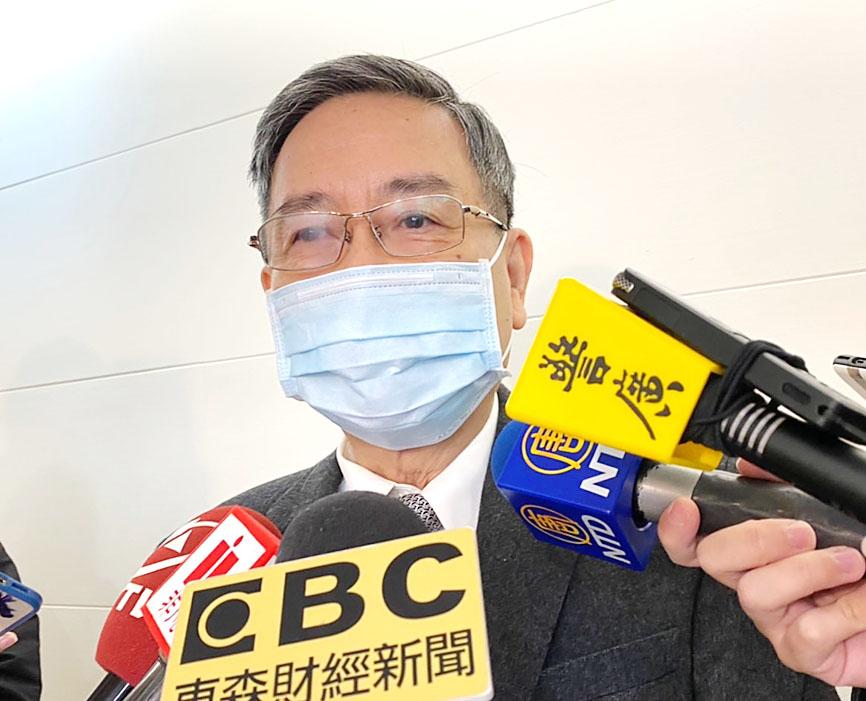The Yuanta-Polaris Research Institute (元大寶華綜經院) yesterday raised its forecast for GDP growth this year from 3.1 percent to 4.4 percent on the back of strong exports, but said that the showing would not be exceptional globally, giving the New Taiwan dollar little room to increase further against the US dollar.
Taiwan’s tech firms have gained importance in global electronics supply chains amid US-China trade tensions and the COVID-19 pandemic, making them major beneficiaries of the remote work and learning trends, as well as enhanced safety stock levels, Yuanta-Polaris president Liang Kuo-yuan (梁國源) said.
The phenomenon, referred to as the bullwhip effect, helps account for the unprecedented prosperity local electronics makers experienced last year and this year, Liang said.

Photo: Wu Chia-ying, Taipei Times
Exports might grow 5.16 percent this year, up from the previous forecast of 5 percent, while imports might increase 3.97 percent, down from 4.07 percent, the Taipei-based think tank forecast.
Private investment could expand 4.07 percent, while consumer spending might grow 3.73 percent, it said.
With projected GDP growth of 4.4 percent, Taiwan would rank somewhere in the middle worldwide, behind major economies such as the US and China, explaining why the NT dollar has lost some momentum against the greenback, it said.
“Global capital has ... flowed to the US market to pursue better investment opportunities,” Liang said.
Yuanta-Polaris expects the NT dollar to trade at an average of NT$28.5 this year versus the greenback. The local currency closed at NT$28.538 against the US dollar in Taipei trading yesterday.
Taiwan’s robust exports would continue to bolster its current account surpluses and countries with strong trade surpluses are unlikely to have a weak currency, Liang said.
The central bank would refrain from intervention next quarter, when the US is due to update its currency report after placing Taiwan on its watch list for currency manipulation in December last year, he said.
Taiwan meets two of the three criteria by having a trade surplus with the US of US$20 billion or more and a current account surplus in excess of 2 percent of GDP, but it can contest the criterion regarding one-sided intervention in the foreign exchange market, he said.
“Taiwan had better shake off currency manipulation charges or it might attract punitive measures from the US, the world’s largest economy,” Liang said.
While the pandemic poses the biggest uncertainty to the global economy, Taiwan should strive to solve water, land, electricity, labor and talent shortages that went unnoticed until the water shortage worsened, he said.
The government should learn from major tech firms in recycling wastewater or the problem could thwart the nation’s industrial development, he added.

Real estate agent and property developer JSL Construction & Development Co (愛山林) led the average compensation rankings among companies listed on the Taiwan Stock Exchange (TWSE) last year, while contract chipmaker Taiwan Semiconductor Manufacturing Co (TSMC, 台積電) finished 14th. JSL Construction paid its employees total average compensation of NT$4.78 million (US$159,701), down 13.5 percent from a year earlier, but still ahead of the most profitable listed tech giants, including TSMC, TWSE data showed. Last year, the average compensation (which includes salary, overtime, bonuses and allowances) paid by TSMC rose 21.6 percent to reach about NT$3.33 million, lifting its ranking by 10 notches

Popular vape brands such as Geek Bar might get more expensive in the US — if you can find them at all. Shipments of vapes from China to the US ground to a near halt last month from a year ago, official data showed, hit by US President Donald Trump’s tariffs and a crackdown on unauthorized e-cigarettes in the world’s biggest market for smoking alternatives. That includes Geek Bar, a brand of flavored vapes that is not authorized to sell in the US, but which had been widely available due to porous import controls. One retailer, who asked not to be named, because

SEASONAL WEAKNESS: The combined revenue of the top 10 foundries fell 5.4%, but rush orders and China’s subsidies partially offset slowing demand Taiwan Semiconductor Manufacturing Co (TSMC, 台積電) further solidified its dominance in the global wafer foundry business in the first quarter of this year, remaining far ahead of its closest rival, Samsung Electronics Co, TrendForce Corp (集邦科技) said yesterday. TSMC posted US$25.52 billion in sales in the January-to-March period, down 5 percent from the previous quarter, but its market share rose from 67.1 percent the previous quarter to 67.6 percent, TrendForce said in a report. While smartphone-related wafer shipments declined in the first quarter due to seasonal factors, solid demand for artificial intelligence (AI) and high-performance computing (HPC) devices and urgent TV-related orders

MINERAL DIPLOMACY: The Chinese commerce ministry said it approved applications for the export of rare earths in a move that could help ease US-China trade tensions Chinese Vice Premier He Lifeng (何立峰) is today to meet a US delegation for talks in the UK, Beijing announced on Saturday amid a fragile truce in the trade dispute between the two powers. He is to visit the UK from yesterday to Friday at the invitation of the British government, the Chinese Ministry of Foreign Affairs said in a statement. He and US representatives are to cochair the first meeting of the US-China economic and trade consultation mechanism, it said. US President Donald Trump on Friday announced that a new round of trade talks with China would start in London beginning today,